Build confidence & get hired: use testimonials to get more speaking opportunities

One of the main reasons why event organizer won’t hire a speaker is because they are not confident the speaker will be able to deliver on their promises. They are afraid of making the wrong decision.
Testimonials build credibility.
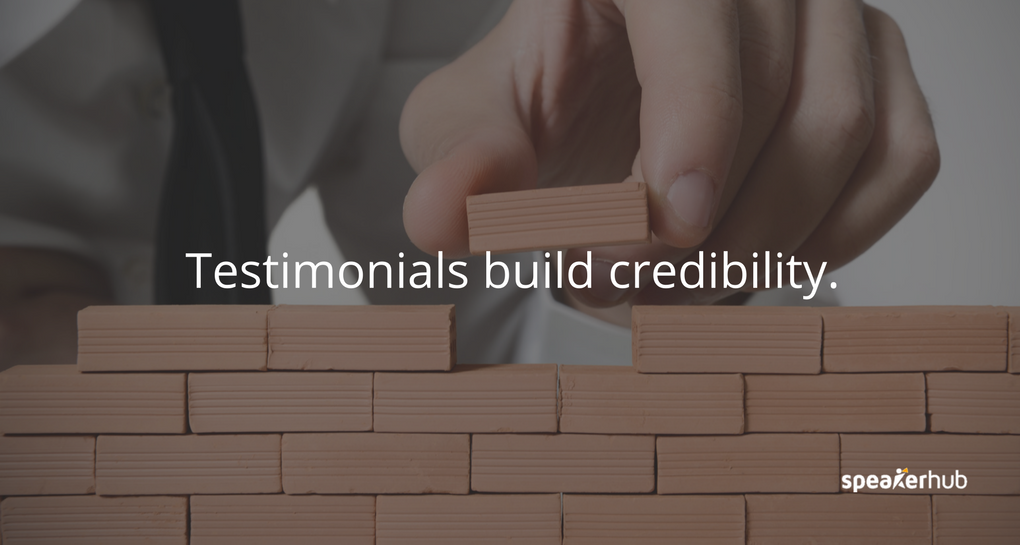
When organizers see a speaker, trainer, moderator or webinar host is endorsed by another event organizer, it reduces the risk in their decision-making and that fear is minimized. Event organizers want to know that organizers who have hired you to speak felt they made a great decision by choosing you. Testimonials remove doubts, concerns and objections.
Reducing the risk in the eyes of the event organizer means you’ll get more bookings. Good testimonials can increase conversions by up to 34% on your profile and website.
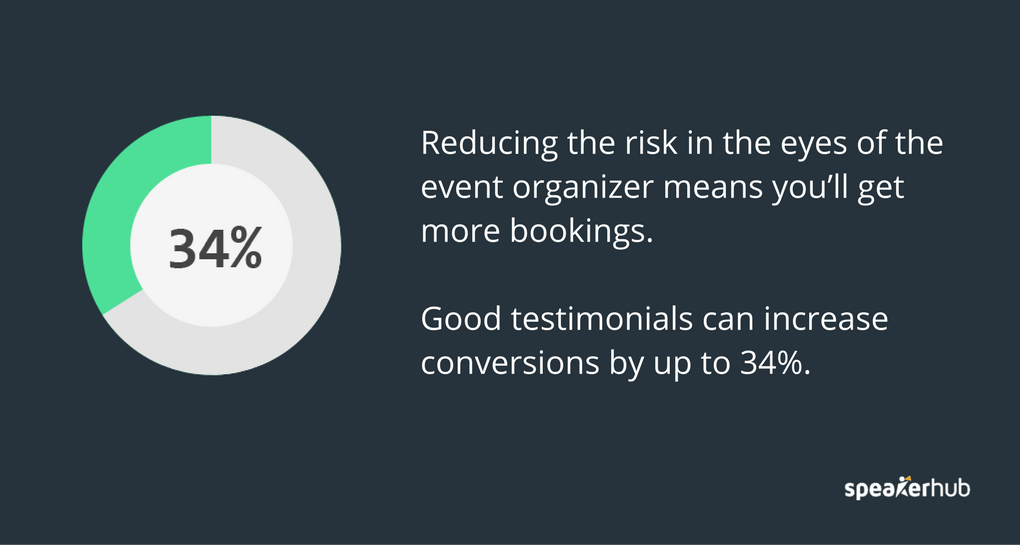
Simply put: testimonials can give organizer confidence that the people who worked with you previously were happy with the results, and you are reputable speaker.
So, what makes a good testimonial?
Hint: it’s not an insincere, fluffy, exaggerated: “John Doe is super amazing. Best speaker in the world,” over-the-top statement.
It needs to be much more direct and helpful.
Great testimonials:
- have clearly stated outcomes. They talk about the effect of working together, or the impact the talk had on the audience. The event organizer knows what they can expect by working with you.
- are easy to read. They hit the sweet spot in word count at roughly 40-50 words. Testimonials that are too short (for example, “He was great, we’d be happy to have him back,”) don’t have enough weight to make them credible, whereas testimonials that are too long will most likely be passed over by the reader.
Badly written testimonials are common because as speakers, we don’t always know how to ask for them, and organizers don’t always know exactly what we are looking for.
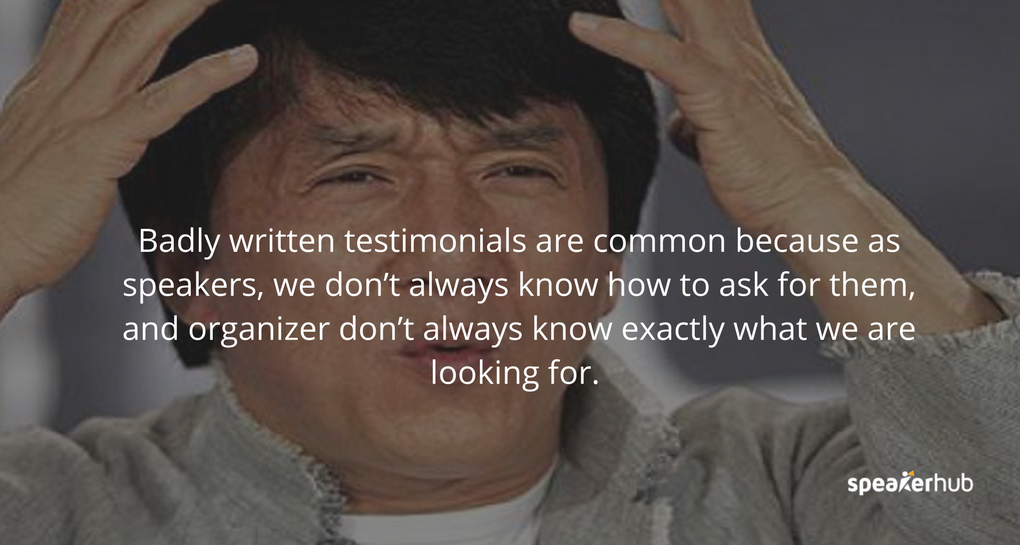
The practical tips below will outline how to master the art of asking, getting and sharing professional testimonials that will help build your speaker business.
Let’s start by looking at who you should be getting a testimonial from.
Who should you get a testimonial from?
- When a testimonial is given by someone who is high ranking in the organization, it gives extra credibility to you, the speaker. Whenever you give a presentation or workshop, a large company, association or conference, focus on getting the head of the organisation to give you a testimonial.
- Frame the person giving the testimonial, and make sure they are relevant to the person reading the testimonial.
As an event organizer, you’re more likely to relate to another event organizer, (e.g. ““John Doe, Event Planner for BigIdeas NYC”) than someone who seems anonymous (e.g. “John Doe, New York City, NY”).
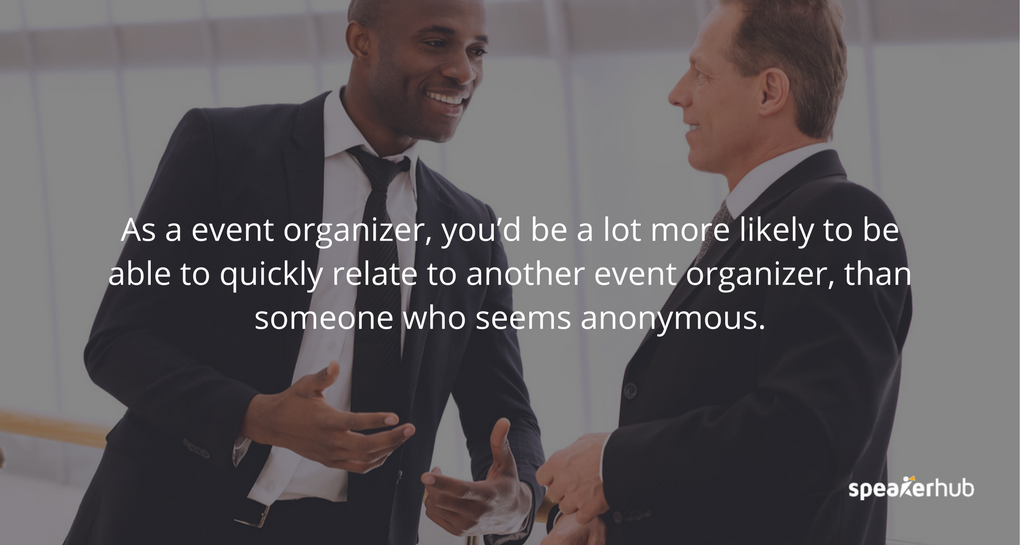
- Testimonials from audience members can also help diversify your testimonials, especially when they thoroughly explore the results of listening to the presentation.
How do I get great testimonials?
It’s not as simple as asking “could you please provide a testimonial?” (although that might be a good place to start.)
If you don’t ask for specific details, don’t be surprised if you get back a generic answer; ones that will neither build your business nor get more organisers to click the “contact” button.
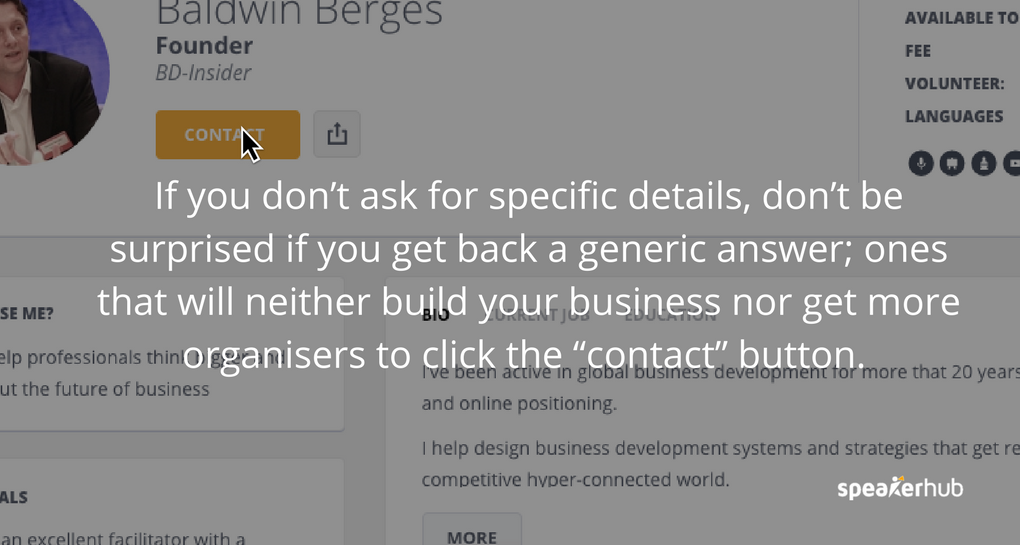
- 1. Be specific about what you are looking for
Here are five questions to ask the organizer to answer in their testimonial:
-
- What was the obstacle that your audience was facing, that you wanted me to address?
- What did you find as a result of the talk?
- What specific part did you like most about the talk?
- Would you recommend my talk? If so, why?
- Is there anything you’d like to add?
- 2. Pick a format
- You have a lot of options for how you’d like to gather and display your testimonial- from Tweets to videos to the effective and reliable written testimonial.
Let’s take a look at the options:
- Written: Email the event organizer and ask them your questions. They will send their answers back. You use their answers to create the testimonial. Very simple.
- Video: When you are following up with the organizer after your talk, and they praise you for a job well done, ask if they wouldn’t mind repeating their praise on camera. If they agree, break out your camera and create a video testimonial interview, where you ask the questions and they answers you on camera.
If this seems too makeshift or you doubt the event organiser will be very good at improvisation, then ask them to make the video with you at your next meeting and send them the questions in advance.
Want to take your testimonials to the next level? Transcribe the video and use certain excerpts as written testimonials.

- Audio: Sound is a valuable tool for making your testimonial stand out, and it can be easily added to your website or a specific SoundCloud page. Use the same techniques as you would for make a video testimonial. Top tip: you can convert your video files into audio as well, using a video-to-audio converter.
- Social media: Monitor your social media platforms for comments or shares from high ranking organizers or influential people. Once you’ve come across something worth saving, grab a screenshot of it. You can build a “feed” of testimonial posts which can be added to your website using a tool like Storify, which allows you to pull posts in from multiple social platforms, then embed it on your website.
- Case studies: These are the most time-consuming and complex testimonial formats, they can also be one of the most powerful ways of showing the results of your presentations. Here are some tips on writing a full case study: “How to Create a Compelling Business Case Study: The Ultimate Guide & Template”
- 3. Be personal.
- One of the least effective ways of getting a meaningful and impactful testimonial is simply sending an organiser a follow up email requesting them to “fill out a brief survey.”
- Scrap that, and try an approach more like this:
Hi, Thank you again for the opportunity to present at your event. I know it helps potential event organizers feel comfortable hiring me when they see that others have had positive experiences working with me. Would you be able to answer a few questions about what it was like working with me?
If the organiser sends you a testimonial that is too big (which is a great problem to have, however, you need the testimonial to be concise and too the point) and you need to edit it, alway make sure you send them the edited version and make sure the content and meaning doesn’t stray from what they provided.
Sharing Testimonials on SpeakerHub:
After you’ve got a collection of great testimonials, it is time to put them to work.
Here are some of the places to use testimonials to promote your talks:
- Your SpeakerHub profile
- Your official website
- Your Speaker One Page
- On social media (your blog, Facebook, Twitter and LinkedIn)
Share it on your SpeakerHub profile page
Add in the testimonials by going to “Profile”>”Edit”>”Testimonials”, and include the email address of the person who originally gave you the testimonial.
Testimonial gallery:
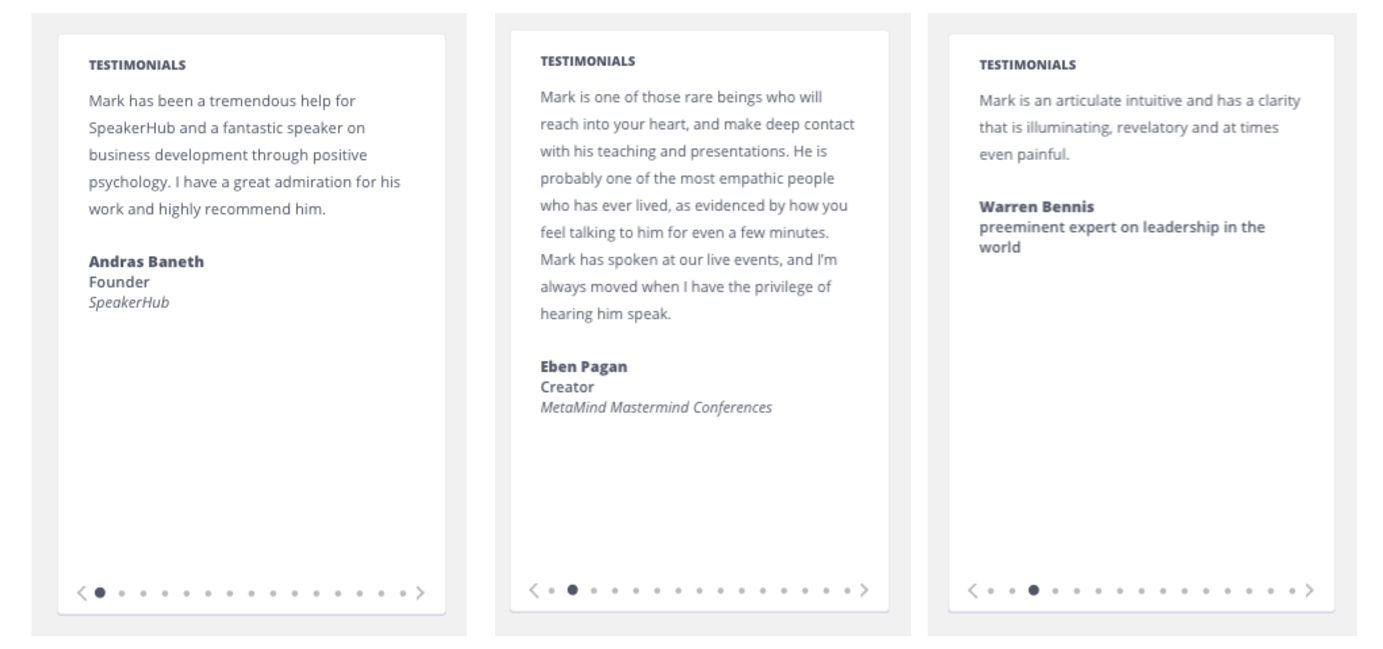
Adding testimonials to your official speaker website:
There are a dozen creative ways you can add testimonials to your speaker website. Below are three great articles to help you figure out the best ways to use testimonials on your site:
- 11 Testimonial Page Examples You'll Want to Copy by Hubspot
- 12 Posts To Perfect Your Customer Testimonials by Unbounce
- “How to Effectively Use Testimonials” (jump to the “Strategies For Using Your Testimonials Effectively”) by Entrepreneur
There’s nothing smarmy or obtuse about asking people what they thought of your talk and using positive, result-based testimonials on your website and speaker profile will build trust and credibility with potential event organizers.

Have you just started trying to build your testimonial collection? What difficulties do you have? We’d love to address them in a future article. Contact us here.









